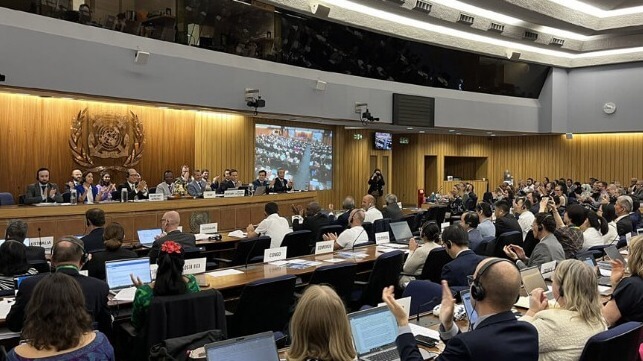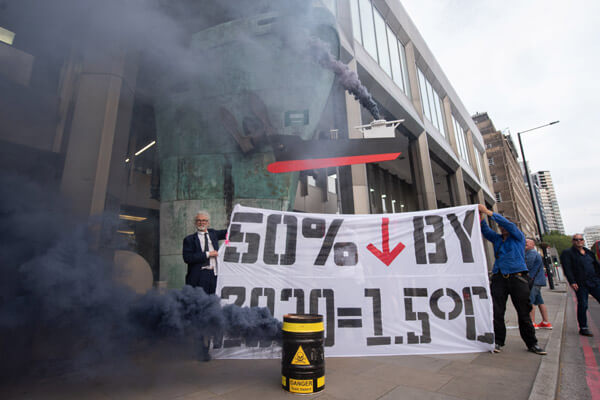Praise and Criticism as IMO Adopts Revised GHG Strategy

The International Maritime Organization formally adopted its revised strategy addressing emissions and the targets to move toward net-zero GCG emissions at the conclusion of the Marine Environment Protection Committee meeting that involved some 1,800 delegates. Reactions are predictably mixed with many saying the statements are weak. Environmentalists are roundly criticizing the IMO as a failure while the shipping industry said it welcomes the clear direction and related organizations called for follow through on the critical next steps.
The IMO itself issued a summary saying that the strategy provides a “clear direction” with enhanced targets to reduce harmful emissions. They are highlighting both the challenge and importance of reaching a unanimous decision saying that the strategy includes an enhanced common ambition while adding a commitment to ensure the uptake of alternative zero and near-zero GHG fuels. The leadership however is also admitting that today is a strategy and not a final solution.
"The adoption of the 2023 IMO Greenhouse Gas Strategy is a monumental development for IMO and opens a new chapter towards maritime decarbonization. At the same time, it is not the end goal, it is in many ways a starting point for the work that needs to intensify even more over the years and decades ahead of us,” said IMO Secretary-General Kitack Lim.
Analysts and experts are still reviewing every word and nuance in the final document but it appears to have been slightly stronger than rumored while falling short of the most ambitious goals. Beyond the goal of a 40 percent reduction in CO2 emissions by 2030 and a five percent goal for alternative fuels, they added language saying they are striving for 10 percent alternative energy. Similarly, the 2030 goal says at least 20 percent and striving for 30 percent while by 2040 they say at least 70 percent while striving for 80 percent. They agreed to develop a global marine fuel standard and emissions pricing mechanism but left the details to be defined by 2024 and 2025 and in place by 2027.

Protestors demanded a definitive goal for 50 percent reductions by 2030 (Ocean Rebellion)
Environmentalists were quick to highlight that the “soft targets” and “vague wording” came in the same week as the planet experienced its hottest day ever. As expected, they came said the IMO’s actions were far from what was needed.
One of the most vocal activist groups, Ocean Rebellion called the IMO a “total failure” while their demonstrators hung a banner outside the headquarters saying the IMO had sold out to fossil fuels. The group wrote in its response, “The IMO is clearly unfit for purpose. It only acts on behalf of the shipping industry and rarely considers the environment. It must halve shipping emissions now, we are already too late for some people to survive the IMOs grisly policies, but not yet for everyone.”
“By dodging obvious reforms like slow sailing, wind, and less international commerce, the IMO condemns the Paris Climate Agreement to death by a thousand meetings,” responded Chris Armstrong of the University of Southampton.
Others also working to move the industry forward with decarbonization took a less harsh stance. Bo Cerup-Simonsen, CEO of the non-profit Maersk Mc-Kinney Moller Center for Zero Carbon Shipping called the strategy a step in the right direction. He however noted that stronger alignment with the Paris Agreement requires a “more progressive reduction of emissions.”

Protestors in front of IMO headquarters accused MPEC of siding with the industry and big oil (Ocean Rebellion)
Shipping industry groups welcomed the clear direction in the IMO’s strategy. The liner trade group BIMCO said it sees the 70 percent target and outlined steps as “groundbreaking.” The UK Chamber of Shipping said it “welcomed the progress towards this increased level of ambition.”
“This marks a new beginning for shipping’s energy transition, with clear goals and milestones,” said John Butler, President & CEO of the World Shipping Council. “There is much to do, and carriers are eager to continue the work together with regulators, fuel providers, and technology providers to reach our shared climate targets. Liner shipping is already investing in renewable fuel-ready ships, and today’s decision broadcasts a strong global signal for investment to the entire maritime sector.”
Similarly, the International Chamber of Shipping said as the principal international trade association it greatly welcomed the ambitious agreement. Simon Bennet, Deputy Secretary General in a prepared statement said, “This historic IMO agreement gives a very strong signal to ship operators and, most importantly, to energy producers who must now urgently supply zero GHG marine fuels in very large quantities if such a rapid transition is to be possible.”

that matters most
Get the latest maritime news delivered to your inbox daily.
The ICS, however like many noted that this is only a partial step. They called on the IMO to rapidly agree on the global levy on ships. The World Shipping Council also said that it views it as vital that the economic and technical measures are brought in to help deliver the end goal and interim targets for 2030 and 2040.
Even among the member states there was a mixed reaction with some hailing the progress. Some of the Pacific states which are among the most exposed to climate change through rising sea levels welcomed the action. It however falls short of the faster and deeper cuts demanded by the United States and others.
